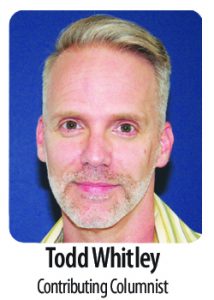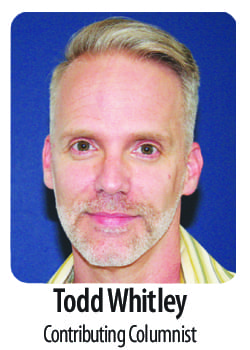Plano serves as the perfect example of why nondiscrimination laws are necessary, despite progress made
Despite where I stand on some political issues, I do understand the desire of many people to want to limit the role of government in their lives. And I understand firsthand the importance of faith and why people want to protect their ability to exercise their religion in their churches as they see fit.
I may not agree with their beliefs, but the Constitution of the United States says others’ religious freedom doesn’t require my consent.
But some religious people — many of them the same ones squawking about the government interfering too much in their personal lives — use the first amendment’s protection of religion as a license to discriminate against people who might not fit into their narrow views.
So, after sitting through three very long, unnerving hours at the Plano City Council meeting Monday night, Dec. 8, where they were holding a public forum on expanding the city’s nondiscrimination policy to include veteran status, sexual orientation and gender identity, I can assure you that our country still, absolutely, needs laws that protect some of its most vulnerable citizens.

At the outset, I started typing a transcript of the speakers. The very first speaker, before finishing with a threat to sue the city, decried, “We will see people of faith subject to criminalization.” The crowd, despite being asked to remain quiet, went wild, as if Dirk Nowitzki had just drained a massive three pointer in a defender’s face.
The hate continued:
“Government should not influence religion or limit people from acting on their religious beliefs,” the second speaker asserted.
“The pendulum of progress should not swing too far,” said the next.
A pastor of a church relocating from Dallas to Plano got up and said that the ordinance was a threat to public safety and freedom of religion and criticized the council for equating “race and veteran status with sexual conduct.” His final reminder to the council was against changing the fabric of Plano.
The next speaker proclaimed he knew of no instances where peoples’ rights were currently being denied and was worried that the people protected by the amended policy would become some type of special beneficiaries.
(This doe-eyed theme of “no discrimination in Plano” would be repeated several times throughout the night.)
After a couple more speakers, I gave up; I couldn’t type anymore of the bile.
With a precious few exceptions, the rest of the speakers came out against the ordinance with a mix of borrowed talking points, various untruths, the plea for more time, the “financial burden to small business” argument, and of course the choruses of “You’re persecuting us by taking away our rights to discriminate.” (That’s my paraphrase, of course.)
Not all the voices were hate-filled, nor were all the Christian viewpoints contradictory to the axiom to treat others as we want to be treated.
A straight man in his early 20s said in his remarks that he was standing with his lesbian sister and urged the city to do the same. A straight faith leader in the community professed her support as an expression of her faith — while being heckled for going over her time limit. During her remarks in support of the amended policy, a lifelong Plano resident and lesbian would ask those of us in support to stand with her.
I had forgotten the practice of some pro-equality folks to wear red to meetings like this; I stood up anyway, thankful I had at least worn burgundy-colored pants. I think this is the first time I really felt my face flush when I stood up for what I believed.
The majority of our allies were on the opposite side of the chamber; only about six to eight of us were where I was sitting. Many members of the audience craned their necks to look at us and sneer, or they looked away, shaking their heads as if in disgust.
Followers of Jesus? Really?
By the time the 30-plus speakers finished, I was emotionally exhausted and concerned not only about the vote count but also about my safety walking to my car when it was over.
I sat there, the hateful words echoing painfully in my head, realizing that despite how far we’ve come, how much equality has been won, there are people hell-bent on using religion, of all things, to keep us from realizing our Constitution-given rights.
But the mayor was next.
Diligent and prepared for the vote that was about to occur, but also visibly frustrated by the opposition’s lack of respect for the governing body and the process, the mayor was clear and resolute. The unnerving fervor of the riled-up religious folks — who lacked only torches and pitchforks to complete the picture — did not deter the mayor, who left no doubt: The city was going to pass this because it was the right thing to do. (You know, “love your neighbor as yourself” kinda stuff.)
And expectedly, they were furious.
“Religious liberty! Fewer laws!” was the theme of the opposition.
But if we trusted the “good judgment” of people — as a couple folks asked — women might still not be voting and we might still have slavery. The same kinds of laws that were necessary to force people to let women vote or own property, to allow people of different races to marry, to require citizens to serve all people regardless of race are still very much needed today for gay and transgender people.
The same people who scream about their lack of rights to discriminate against gay and transgender people are the direct descendants of the people who once needed the laws to force them to treat women and blacks and disabled people equally.
Personally, I am disgusted by those who sling around terms like “homosexual conduct” (they are using that word purposefully) and the sheer gall of those who reduce the experience of transgender people to “a man who would put on a dress in order to prey on a woman or a child in a bathroom.”
Plain and simple, these people are not truth-tellers. The Jesus of their Bible neither addressed loving, same-gender relationships nor explained his views of those who choose to express their gender based on what the individual — not society — believes it to be. (Hint: love your freakin neighbor as yourself).
But Jesus did talk a lot about telling the truth and about loving people.
The notion that anyone’s bathroom safety is at risk because of allowing a person to self-determine which bathroom to use is an outright fabrication. Like choosing to walk on the other side of the sidewalk when a black man is approaching, a person may feel uncomfortable around a transgender person. But bias is not protected by law.
Transgender people simply want to use the bathroom safely just like everyone else.
Further, the belief that someone’s religion allows them to discriminate is wholly against the scripture these people claim to adhere to so vigorously. Faith gives no one license to refuse to serve someone of a different color, or to own them and make them harvest their cotton, or make them stay in the home and keep silent with no say in society, or . …
Wait. What century are we in? Seriously.
I am grateful that yet another municipality saw fit to stand for those among them who need the protection of government. I admire the bravery of their stand and how many did so outwardly, because their faith compelled them to.
How I wish we didn’t need laws to compel citizens to do the right thing, that we could rely on the good judgment of people, that we could trust the words of those claiming to practice a guideline suggested by many different religions: “Do unto others as you would have them do unto you.”
But we are not there yet.
Not even close.
Todd Whitley is a local activist and communications manager for Equality Texas. He can usually be found tweeting (@toddwhitley), holding a picket sign, thrift store shopping or eating Tex-Mex. Read his blog at tdub68.wordpress.com
This article appeared in the Dallas Voice print edition December 12, 2014


